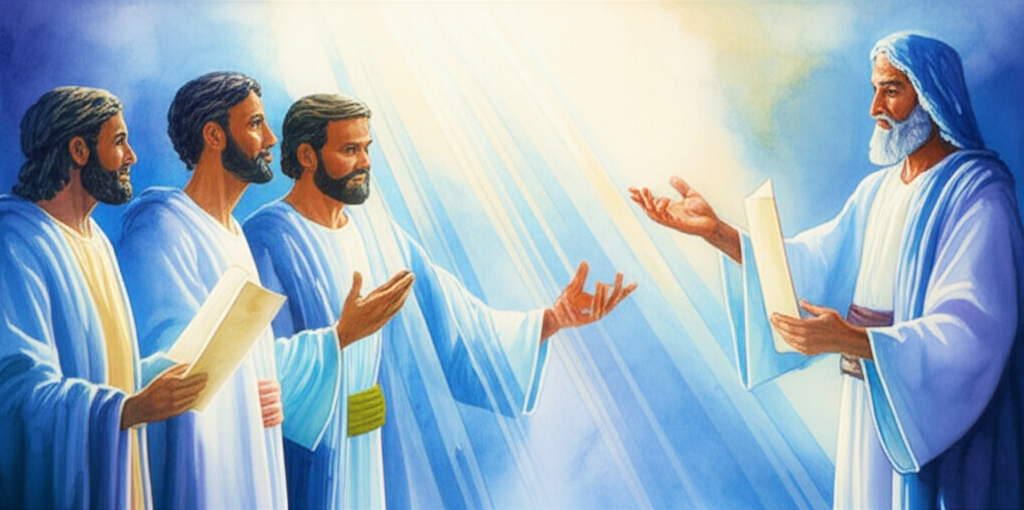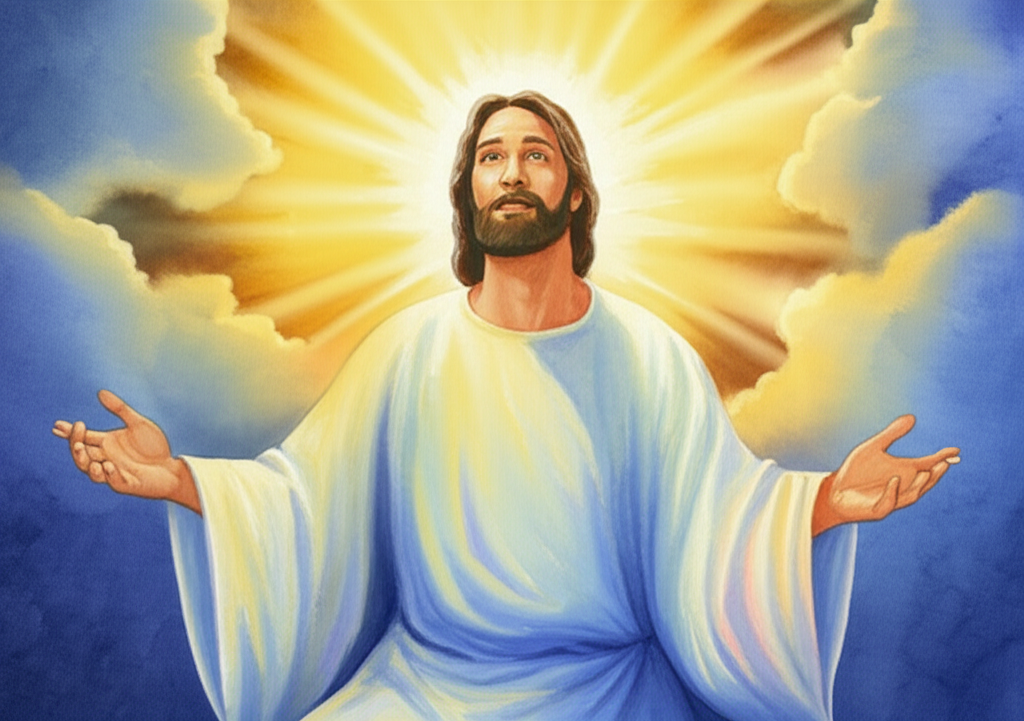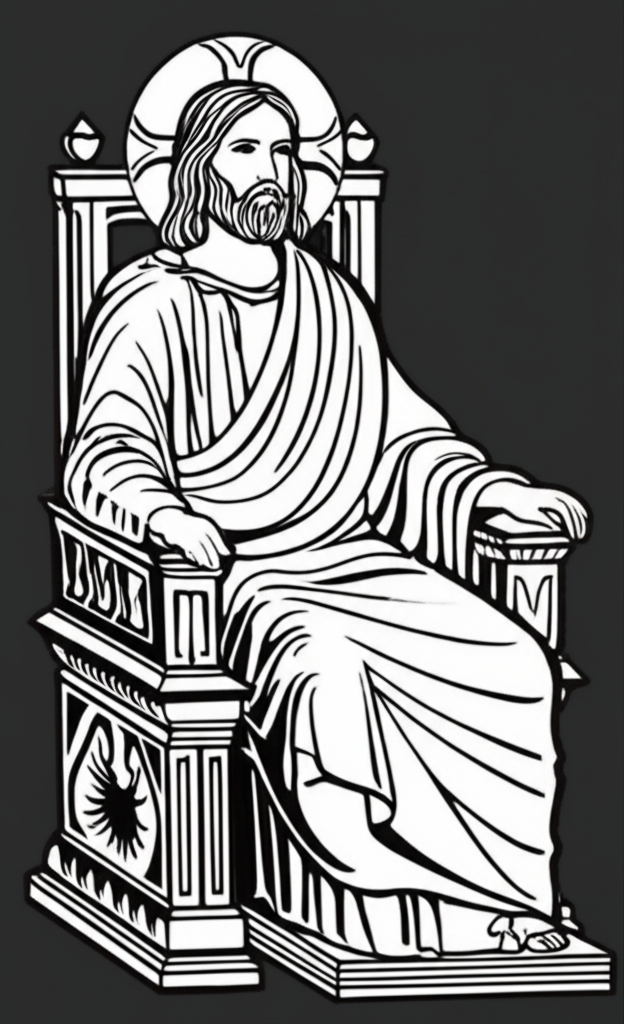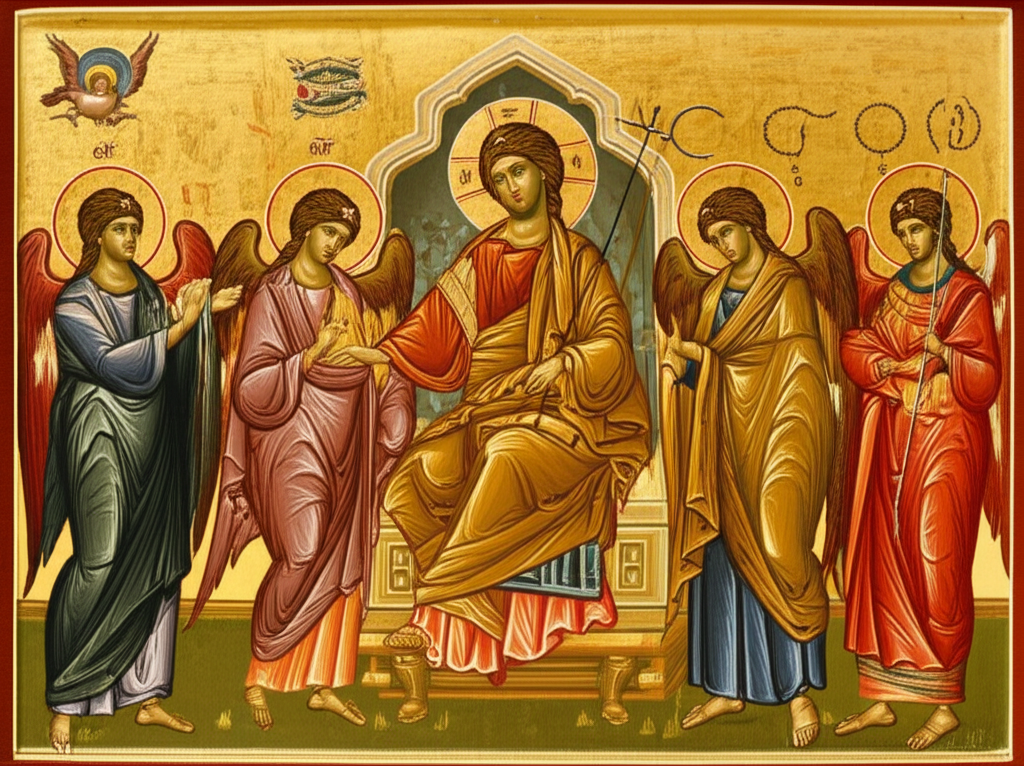Hebrews 1 meaning explained in AI Summary
Hebrews 1 establishes Jesus Christ's absolute supremacy over all creation, including angels. It contrasts the partial and fragmented revelations given through prophets in the past with the complete and final revelation given through Jesus, God's own Son.
Here are the key points:
1. Jesus is Superior to the Prophets (1:1-4):
- God spoke to our ancestors through prophets in various ways and times.
- But now, in these last days, God has spoken to us through His Son, Jesus.
- Jesus is the heir of all things and the creator of the universe.
- He is the radiance of God's glory and the exact representation of His nature.
- He upholds all things by the word of His power.
- After providing purification for sins, He sat down at the right hand of the Majesty on high.
2. Jesus is Superior to Angels (1:5-14):
- God never said to any angel, "You are my Son; today I have become your Father."
- Nor did He say, "I will be his Father, and he will be my Son."
- But about the Son, God said, "Your throne, O God, will last forever and ever."
- Angels are commanded to worship Jesus.
- Angels are ministering spirits sent to serve those who will inherit salvation.
The chapter emphasizes:
- Jesus' unique Sonship: He is God's Son in a way no angel or human ever could be.
- Jesus' role as Creator and Sustainer: He is not just a messenger, but the one who created and upholds everything.
- Jesus' atoning sacrifice: He didn't just speak about sin, He purified us from it.
- Jesus' exaltation: He sits at God's right hand, a position of supreme authority and honor.
The purpose of this chapter:
- To establish the absolute supremacy and divinity of Jesus Christ.
- To encourage Jewish Christians to remain faithful to Jesus, the ultimate and final revelation of God.
- To warn against returning to the old covenant and its insufficient ways.
This chapter lays the foundation for the rest of the book, which will further explore the superiority of Christ's priesthood, covenant, and sacrifice.
Hebrews 1 bible study ai commentary
The central theme of Hebrews 1 is the absolute supremacy of God's Son, Jesus Christ. The author establishes that Christ is the ultimate and final revelation of God, far superior to the prophets of the Old Testament and infinitely greater than the angels. This is accomplished by presenting Christ's divine nature, his role in creation and sustenance, his work of redemption, and his eternal, enthroned glory, proven through a chain of Old Testament quotations that identify Him with Yahweh.
Hebrews 1 context
The Book of Hebrews was written to a community of Jewish Christians who were suffering persecution and were tempted to abandon their faith in Christ and return to the more familiar and established traditions of Judaism. The author argues that leaving Christ is not a return to the source, but an abandonment of the very fulfillment to which the entire Old Testament pointed. The high status of angels as mediators of the Law in Second Temple Judaism (cf. Acts 7:53; Gal 3:19) necessitated the author's strong polemic in this first chapter: to demonstrate that Jesus is not merely a high-ranking angel but is, in fact, God the Son, the object of angelic worship. The author uses a highly sophisticated Greek and quotes exclusively from the Septuagint (LXX), the Greek translation of the Old Testament.
Hebrews 1:1-2
Long ago, at many times and in many ways, God spoke to our fathers by the prophets, but in these last days he has spoken to us by his Son, whom he appointed the heir of all things, through whom also he made the world.
In-depth-analysis
- "Many times and in many ways" (Gk. polumerōs kai polutropōs): This highlights the fragmentary and diverse nature of Old Testament revelation (through visions, dreams, audible voice, historical events, types).
- Contrast of Eras: A sharp distinction is drawn between "long ago" (the Old Covenant era) and "in these last days" (the Messianic era initiated by Christ).
- Contrast of Messengers: Revelation shifted from multiple "prophets" to a single, superior agent: "his Son." This isn't just a better messenger; He is the message. The prophets spoke about God; the Son is the speech of God.
- The Son's Titles & Roles:
- Heir of all things: This speaks to His supreme rank and ultimate inheritance of all creation. It is an eschatological and royal title.
- Through whom He made the world (Gk. aiōnas - ages/universe): This establishes the Son's pre-existence and His active role as the agent of all creation.
Bible references
- John 1:1, 14: "In the beginning was the Word... and the Word became flesh..." (Christ as eternal Word and divine revelation).
- Colossians 1:16: "For by him all things were created... all things were created through him and for him." (Christ as agent and goal of creation).
- Galatians 4:4: "But when the fullness of time had come, God sent forth his Son..." (Marks the new era).
Cross references
Num 12:6-8 (prophets vs Moses), Deut 18:15 (prophet like Moses), John 3:16 (God sent His Son), Rom 8:17 (heirs of God), 1 Cor 8:6 (through whom are all things).
Hebrews 1:3
He is the radiance of the glory of God and the exact imprint of his nature, and he upholds the universe by the word of his power. After making purification for sins, he sat down at the right hand of the Majesty on high,
In-depth-analysis
This single verse contains a powerful seven-fold description of Christ's person and work.
- "Radiance of the glory of God" (Gk. apaugasma): Christ is not a reflection of glory, but the very effulgence or shining out of glory. Like the sun and its light, they are distinct yet inseparable and of the same essence.
- "Exact imprint of his nature" (Gk. charaktēr tēs hupostaseōs autou): Charaktēr refers to an impression made by a seal. Jesus perfectly bears the image and reveals the very substance (hupostasis) of the invisible God. To see Jesus is to see the Father.
- "He upholds the universe" (Gk. pherōn): Present active participle, meaning He is continuously and actively sustaining and carrying along all of creation by His powerful command.
- "Making purification for sins": This points to His priestly work on the cross, a central theme of Hebrews. The purification is a completed act ("having made").
- "Sat down": This signifies the completion of His redemptive work. Priests in the Old Testament tabernacle always stood, as their work was never finished. Christ's sitting signifies finality and victory.
- "At the right hand": The position of ultimate honor, power, and authority, co-ruling with the Father.
Bible references
- John 14:9: "...Whoever has seen me has seen the Father..." (Confirms Christ as the perfect representation).
- Colossians 1:15, 17: "He is the image of the invisible God... and in him all things hold together." (Parallels both representation and sustenance).
- Psalm 110:1: "...'Sit at my right hand, until I make your enemies your footstool.'" (The ultimate source for the "right hand" motif).
Cross references
2 Cor 4:4 (image of God), Phil 2:6 (in the form of God), Titus 2:14 (purify for Himself a people), Eph 1:7 (redemption through His blood), Eph 1:20 (seated at His right hand), Rev 3:21 (sit with Me on My throne).
Hebrews 1:4
having become as much superior to angels as the name he has inherited is more excellent than theirs.
In-depth-analysis
- This verse is the thesis statement for the argument that follows (vv. 5-14).
- "Having become... superior" (Gk. kreittōn): The word for "better" or "superior" is a key theme of the entire book. His superiority is not something newly attained in His essence, but demonstrated and publicly declared through His exaltation after His finished work.
- "The name he has inherited": This name is "Son," which signifies a unique relationship, nature, and authority that no angel possesses. The "inheritance" is linked to His enthronement as the Messianic King.
Bible references
- Philippians 2:9-10: "Therefore God has highly exalted him and bestowed on him the name that is above every name..." (Exaltation and a superior name).
- Ephesians 1:21: "[seated him at his right hand] ...far above all rule and authority and power and dominion, and above every name that is named..." (Superiority over all angelic beings).
Cross references
Matt 28:18 (all authority given), 1 Pet 3:22 (angels...subject to him).
Hebrews 1:5
For to which of the angels did God ever say, “You are my Son, today I have begotten you”? Or again, “I will be to him a father, and he shall be to me a son”?
In-depth-analysis
- The author begins a chain of seven OT quotations to prove Christ's superiority.
- The question is rhetorical; the expected answer is "To no angel!"
- "You are my Son, today I have begotten you" (Psalm 2:7): This is a royal psalm for a Davidic king's coronation. "Today" does not refer to the beginning of his existence but to the moment of his public installation as king. In the NT, this is applied to Christ's resurrection and ascension, which is his coronation as the Messianic King (Acts 13:33).
- "I will be to him a father..." (2 Samuel 7:14): This promise from the Davidic Covenant, originally given regarding Solomon, finds its ultimate and perfect fulfillment in Christ, David's greater Son. No angel shares this covenantal father-son relationship with God.
Bible references
- Psalm 2:7: “You are my Son; today I have begotten you.” (Direct quotation).
- 2 Samuel 7:14: “I will be to him a father, and he shall be to me a son.” (Direct quotation).
- Acts 13:33: "this he has fulfilled... in raising Jesus, as also it is written in the second Psalm, ‘You are my Son, today I have begotten you.’" (Apostolic interpretation linking Psalm 2 to the resurrection).
Cross references
Rom 1:4 (declared Son of God by resurrection), Luke 1:32 (heir to the throne of David), Heb 5:5 (applies Psalm 2 to Christ's priesthood).
Hebrews 1:6
And again, when he brings the firstborn into the world, he says, “Let all God’s angels worship him.”
In-depth-analysis
- "Firstborn" (Gk. prōtotokos): In Jewish context, this title refers to preeminence in rank, status, and inheritance rights, not necessarily being first in a sequence of time. Christ is the "firstborn" as the preeminent heir of creation and resurrection.
- "Let all God's angels worship him": This is the ultimate proof of superiority. Angels are subjects and worshipers; the Son is the object of worship. They bow down; He is enthroned. The quotation is likely from the Septuagint version of Deut. 32:43 or Ps. 97:7.
Bible references
- Colossians 1:15, 18: "He is the image of the invisible God, the firstborn of all creation... He is... the firstborn from the dead..." (Defining "firstborn" as preeminence).
- Psalm 97:7: "All gods bow down before him." (The LXX reads "all his angels").
- Revelation 5:11-12: "And I heard the voice of many angels... saying with a loud voice, ‘Worthy is the Lamb who was slain...’” (The fulfillment where angels worship Christ).
Cross references
Rom 8:29 (firstborn among many brothers), Phil 2:10 (at the name of Jesus every knee should bow), Neh 9:6 (hosts of heaven worship You).
Hebrews 1:7
Of the angels he says, “He makes his angels winds, and his ministers a flame of fire.”
In-depth-analysis
- This quotation from Psalm 104:4 describes the nature and role of angels in contrast to the Son.
- Angels are part of the created order ("He makes...").
- They are described using metaphors for natural forces ("winds," "fire"), emphasizing their role as God's swift, powerful servants and agents. Their nature is changeable and ministerial. They are part of creation, not its creator.
Bible references
- Psalm 104:4: "He makes his messengers winds, his ministers a flaming fire." (Direct quotation).
- Psalm 148:2, 5: "Praise him, all his angels... Let them praise the name of the Lord! For he commanded and they were created." (Emphasizes angels are created beings).
Cross references
2 Kgs 2:11 (chariot of fire), Ezek 1:13-14 (angels like fire and lightning), Dan 7:10 (fiery stream).
Hebrews 1:8-9
But of the Son he says, “Your throne, O God, is forever and ever, the scepter of your kingdom is a scepter of uprightness; you have loved righteousness and hated wickedness; therefore God, your God, has anointed you with the oil of gladness beyond your companions.”
In-depth-analysis
- "But of the Son... Your throne, O God...": This quote from Psalm 45:6-7, a royal wedding psalm, is directly applied to the Son, explicitly calling him "God" (Gk. ho Theos). This is one of the clearest statements of Christ's deity in the New Testament.
- Eternal Kingship: Unlike the created, serving angels, the Son possesses an eternal throne and an everlasting kingdom.
- Moral Character: His reign is defined by a "scepter of uprightness," rooted in His love for righteousness and hatred of wickedness, a character quality demonstrated in His earthly life and sacrificial death.
- "God, your God, has anointed you": This shows a distinction of Persons within the Godhead. God the Father anoints God the Son, setting Him apart for his kingly role. This "anointing" with "gladness" points to His joyous exaltation.
Bible references
- Psalm 45:6-7: “Your throne, O God, is forever and ever... therefore God, your God, has anointed you...” (Direct quotation).
- John 20:28: "...Thomas answered him, 'My Lord and my God!'" (Another direct attribution of deity to Jesus).
- Isaiah 61:1: "The Spirit of the Lord God is upon me, because the Lord has anointed me..." (Messianic anointing).
Cross references
Isa 9:7 (increase of his government... no end), Dan 7:14 (dominion is everlasting), Ps 89:14 (righteousness foundation of Your throne), Luke 4:18 (applies Isa 61 to Himself).
Hebrews 1:10-12
And, “You, Lord, laid the foundation of the earth in the beginning, and the heavens are the work of your hands; they will perish, but you remain; they will all wear out like a garment, like a robe you will roll them up, and like a garment they will be changed. But you are the same, and your years will have no end.”
In-depth-analysis
- Here the author applies Psalm 102:25-27 directly to the Son. In its original context, this psalm is addressed to Yahweh. By applying it to Jesus, the author unequivocally identifies Jesus with the eternal Creator God of the Old Testament.
- Creator vs. Creation: A stark contrast is drawn. The heavens and earth, the greatest works of creation, are temporary and will "wear out."
- Immutability and Eternity of the Son: In contrast, the Son "remains" and is "the same" (su de ho autos ei). He is eternal, unchangeable, and exists outside and above the created order He brought into being.
Bible references
- Psalm 102:25-27: "Of old you laid the foundation of the earth... But you are the same, and your years have no end." (Direct quotation).
- John 1:3: "All things were made through him, and without him was not any thing made that was made." (Reinforces Christ as Creator).
- Malachi 3:6: "For I the Lord do not change..." (The immutability of God, a quality here ascribed to the Son).
Cross references
Gen 1:1 (In the beginning, God created), Isa 34:4 (heavens rolled up), 2 Pet 3:10 (heavens will pass away), Rev 21:1 (a new heaven and a new earth).
Hebrews 1:13
And to which of the angels has he ever said, “Sit at my right hand until I make your enemies a footstool for your feet”?
In-depth-analysis
- This final rhetorical question uses the most frequently cited Old Testament passage in the New Testament: Psalm 110:1.
- Uniqueness of Christ's Position: No angel was ever invited to sit at God's right hand. This position of co-regency, ultimate authority, and honored rest is reserved for the Son alone.
- Vindication and Sovereignty: It implies a posture of completed victory. While there is a process ("until I make your enemies..."), His seated position declares His final triumph is assured. Angels stand and serve; the Son sits and reigns.
Bible references
- Psalm 110:1: "The Lord says to my Lord: 'Sit at my right hand...'" (Direct quotation).
- Matthew 22:41-45: Jesus uses this psalm to demonstrate that the Messiah is more than just David's son; he is David's Lord.
- Acts 2:34-35: Peter declares that this psalm was fulfilled not by David, but by the risen and ascended Christ.
Cross references
Mark 12:36, Luke 20:42, 1 Cor 15:25 (He must reign until...), Eph 1:20 (seated at His right hand), Col 3:1 (Christ seated), Heb 10:12.
Hebrews 1:14
Are they not all ministering spirits sent out to serve for the sake of those who are to inherit salvation?
In-depth-analysis
- This verse concludes the argument by defining the role of angels in contrast to the Son.
- "Ministering spirits" (Gk. leitourgika pneumata): Leitourgia is a word often used for priestly or public service. Their function is service and worship, executed on God's behalf.
- "Sent out to serve" (Gk. diakonian): Their mission is one of diakonia—service or ministry.
- Beneficiaries of Their Ministry: The shocking point is that these glorious beings are sent to serve future heirs of salvation—that is, redeemed human beings. This inverts the hierarchy. Humans, though lower than angels in the natural order (Hebrews 2:7), are the focus of God's redemptive plan and become the ones served by angels.
- This final point sets the stage for Chapter 2, which will exhort the reader not to drift away from this great salvation mediated by so great a Son.
Bible references
- Psalm 34:7: "The angel of the Lord encamps around those who fear him, and delivers them." (An example of angelic service to believers).
- Matthew 18:10: "...in heaven their angels always see the face of my Father..." (Guardian angels serving "little ones").
- Acts 12:7-11: An angel is sent to rescue Peter from prison. (An example of angelic ministry for a believer).
Cross references
Dan 7:10 (thousands attended him), Luke 16:22 (angels carried Lazarus), Gen 19:15 (angels rescuing Lot).
Polemics: This verse directly counters any ideology that would encourage the worship of angels (as warned against in Colossians 2:18). It firmly establishes them as fellow servants, not objects of worship. Their purpose is to assist believers, who through Christ hold a higher status as heirs of salvation.
Hebrews Chapter 1 analysis
- Argument Structure: The chapter flows from a general thesis (vv. 1-4) to a specific proof using a catena (chain) of seven OT quotations (vv. 5-14). This use of the number seven may signify a complete and perfect argument.
- Christology: Hebrews 1 is a cornerstone of high Christology in the Bible. It asserts Jesus is:
- The final, perfect revelation of God.
- The pre-existent agent of Creation.
- The sustainer of the universe.
- The radiance of God's very being (Deity).
- The redeemer who purified from sin.
- The exalted and eternal King.
- The object of angelic worship.
- The unchangeable Lord (Yahweh) of the Old Testament.
- Use of the Old Testament: The author brilliantly re-reads the Old Testament through the lens of Christ's fulfillment. Passages originally about Davidic kings (Ps 2, 2 Sam 7), a royal wedding (Ps 45), and even Yahweh Himself (Ps 102) are shown to point ultimately and most fully to Jesus Christ. He consistently uses the Greek Septuagint (LXX), which was the Bible of his Greek-speaking audience.
Hebrews 1 summary
Hebrews chapter 1 establishes the absolute supremacy and deity of Jesus Christ. It argues that while God spoke in various partial ways through prophets in the past, He has now delivered His final and complete word through His Son. Through a chain of seven Old Testament quotations, the author proves that the Son is superior to angels, identifying Him as the eternal, creator God who is worshiped by angels, and the exalted King who reigns forever from God's right hand.
Hebrews 1 AI Image Audio and Video











Hebrews chapter 1 kjv
- 1 God, who at sundry times and in divers manners spake in time past unto the fathers by the prophets,
- 2 Hath in these last days spoken unto us by his Son, whom he hath appointed heir of all things, by whom also he made the worlds;
- 3 Who being the brightness of his glory, and the express image of his person, and upholding all things by the word of his power, when he had by himself purged our sins, sat down on the right hand of the Majesty on high:
- 4 Being made so much better than the angels, as he hath by inheritance obtained a more excellent name than they.
- 5 For unto which of the angels said he at any time, Thou art my Son, this day have I begotten thee? And again, I will be to him a Father, and he shall be to me a Son?
- 6 And again, when he bringeth in the firstbegotten into the world, he saith, And let all the angels of God worship him.
- 7 And of the angels he saith, Who maketh his angels spirits, and his ministers a flame of fire.
- 8 But unto the Son he saith, Thy throne, O God, is for ever and ever: a sceptre of righteousness is the sceptre of thy kingdom.
- 9 Thou hast loved righteousness, and hated iniquity; therefore God, even thy God, hath anointed thee with the oil of gladness above thy fellows.
- 10 And, Thou, Lord, in the beginning hast laid the foundation of the earth; and the heavens are the works of thine hands:
- 11 They shall perish; but thou remainest; and they all shall wax old as doth a garment;
- 12 And as a vesture shalt thou fold them up, and they shall be changed: but thou art the same, and thy years shall not fail.
- 13 But to which of the angels said he at any time, Sit on my right hand, until I make thine enemies thy footstool?
- 14 Are they not all ministering spirits, sent forth to minister for them who shall be heirs of salvation?
Hebrews chapter 1 nkjv
- 1 God, who at various times and in various ways spoke in time past to the fathers by the prophets,
- 2 has in these last days spoken to us by His Son, whom He has appointed heir of all things, through whom also He made the worlds;
- 3 who being the brightness of His glory and the express image of His person, and upholding all things by the word of His power, when He had by Himself purged our sins, sat down at the right hand of the Majesty on high,
- 4 having become so much better than the angels, as He has by inheritance obtained a more excellent name than they.
- 5 For to which of the angels did He ever say: "You are My Son, Today I have begotten You"? And again: "I will be to Him a Father, And He shall be to Me a Son"?
- 6 But when He again brings the firstborn into the world, He says: "Let all the angels of God worship Him."
- 7 And of the angels He says: "Who makes His angels spirits And His ministers a flame of fire."
- 8 But to the Son He says: "Your throne, O God, is forever and ever; A scepter of righteousness is the scepter of Your kingdom.
- 9 You have loved righteousness and hated lawlessness; Therefore God, Your God, has anointed You With the oil of gladness more than Your companions."
- 10 And: "You, LORD, in the beginning laid the foundation of the earth, And the heavens are the work of Your hands.
- 11 They will perish, but You remain; And they will all grow old like a garment;
- 12 Like a cloak You will fold them up, And they will be changed. But You are the same, And Your years will not fail."
- 13 But to which of the angels has He ever said: "Sit at My right hand, Till I make Your enemies Your footstool"?
- 14 Are they not all ministering spirits sent forth to minister for those who will inherit salvation?
Hebrews chapter 1 niv
- 1 In the past God spoke to our ancestors through the prophets at many times and in various ways,
- 2 but in these last days he has spoken to us by his Son, whom he appointed heir of all things, and through whom also he made the universe.
- 3 The Son is the radiance of God's glory and the exact representation of his being, sustaining all things by his powerful word. After he had provided purification for sins, he sat down at the right hand of the Majesty in heaven.
- 4 So he became as much superior to the angels as the name he has inherited is superior to theirs.
- 5 For to which of the angels did God ever say, "You are my Son; today I have become your Father"? Or again, "I will be his Father, and he will be my Son"?
- 6 And again, when God brings his firstborn into the world, he says, "Let all God's angels worship him."
- 7 In speaking of the angels he says, "He makes his angels spirits, and his servants flames of fire."
- 8 But about the Son he says, "Your throne, O God, will last for ever and ever; a scepter of justice will be the scepter of your kingdom.
- 9 You have loved righteousness and hated wickedness; therefore God, your God, has set you above your companions by anointing you with the oil of joy."
- 10 He also says, "In the beginning, Lord, you laid the foundations of the earth, and the heavens are the work of your hands.
- 11 They will perish, but you remain; they will all wear out like a garment.
- 12 You will roll them up like a robe; like a garment they will be changed. But you remain the same, and your years will never end."
- 13 To which of the angels did God ever say, "Sit at my right hand until I make your enemies a footstool for your feet"?
- 14 Are not all angels ministering spirits sent to serve those who will inherit salvation?
Hebrews chapter 1 esv
- 1 Long ago, at many times and in many ways, God spoke to our fathers by the prophets,
- 2 but in these last days he has spoken to us by his Son, whom he appointed the heir of all things, through whom also he created the world.
- 3 He is the radiance of the glory of God and the exact imprint of his nature, and he upholds the universe by the word of his power. After making purification for sins, he sat down at the right hand of the Majesty on high,
- 4 having become as much superior to angels as the name he has inherited is more excellent than theirs.
- 5 For to which of the angels did God ever say, "You are my Son, today I have begotten you"? Or again, "I will be to him a father, and he shall be to me a son"?
- 6 And again, when he brings the firstborn into the world, he says, "Let all God's angels worship him."
- 7 Of the angels he says, "He makes his angels winds, and his ministers a flame of fire."
- 8 But of the Son he says, "Your throne, O God, is forever and ever, the scepter of uprightness is the scepter of your kingdom.
- 9 You have loved righteousness and hated wickedness; therefore God, your God, has anointed you with the oil of gladness beyond your companions."
- 10 And, "You, Lord, laid the foundation of the earth in the beginning, and the heavens are the work of your hands;
- 11 they will perish, but you remain; they will all wear out like a garment,
- 12 like a robe you will roll them up, like a garment they will be changed. But you are the same, and your years will have no end."
- 13 And to which of the angels has he ever said, "Sit at my right hand until I make your enemies a footstool for your feet"?
- 14 Are they not all ministering spirits sent out to serve for the sake of those who are to inherit salvation?
Hebrews chapter 1 nlt
- 1 Long ago God spoke many times and in many ways to our ancestors through the prophets.
- 2 And now in these final days, he has spoken to us through his Son. God promised everything to the Son as an inheritance, and through the Son he created the universe.
- 3 The Son radiates God's own glory and expresses the very character of God, and he sustains everything by the mighty power of his command. When he had cleansed us from our sins, he sat down in the place of honor at the right hand of the majestic God in heaven.
- 4 This shows that the Son is far greater than the angels, just as the name God gave him is greater than their names.
- 5 For God never said to any angel what he said to Jesus: "You are my Son.
Today I have become your Father. "
God also said, "I will be his Father,
and he will be my Son." - 6 And when he brought his supreme Son into the world, God said, "Let all of God's angels worship him."
- 7 Regarding the angels, he says, "He sends his angels like the winds,
his servants like flames of fire." - 8 But to the Son he says, "Your throne, O God, endures forever and ever.
You rule with a scepter of justice. - 9 You love justice and hate evil.
Therefore, O God, your God has anointed you,
pouring out the oil of joy on you more than on anyone else." - 10 He also says to the Son, "In the beginning, Lord, you laid the foundation of the earth
and made the heavens with your hands. - 11 They will perish, but you remain forever.
They will wear out like old clothing. - 12 You will fold them up like a cloak
and discard them like old clothing.
But you are always the same;
you will live forever." - 13 And God never said to any of the angels, "Sit in the place of honor at my right hand
until I humble your enemies,
making them a footstool under your feet." - 14 Therefore, angels are only servants ? spirits sent to care for people who will inherit salvation.
- Bible Book of Hebrews
- 1 The Supremacy of God's Son
- 2 Warning Against Neglecting Salvation
- 3 Jesus Greater Than Moses
- 4 Jesus the Great High Priest
- 5 Warning Against Apostasy
- 6 The Certainty of God's Promise
- 7 The Priestly Order of Melchizedek
- 8 Jesus, High Priest of a Better Covenant
- 9 The Earthly Holy Place
- 10 Jesus Christ died once and for all
- 11 Men of old By Faith
- 12 Jesus, Founder and Perfecter of Our Faith
- 13 Sacrifices Pleasing to God